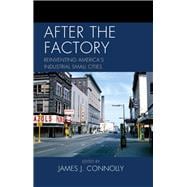
What is included with this book?
| Figures and Tables | p. vii |
| Acknowledgments | p. ix |
| Can They Do It? The Capacity of Small Rust-Belt Cities to Reinvent Themselves in a Global Economy | p. 1 |
| Model Cities, Mill Towns, and Industrial Peripheries: Small Industrial Cities in Twentieth-Century America | p. 19 |
| From Satellite City to Burb of the 'Burgh: Deindustrialization and Community Identity in Steubenville, Ohio | p. 49 |
| Creating an "Image Center": Reimagining Omaha's Downtown and Riverfront, 1986-2003 | p. 87 |
| The Gravity of Capital: Spatial and Economic Transformation in Muncie, Indiana, 1917-1940 | p. 115 |
| Curing the Rust Belt?: Neoliberal Health Care, Class, and Race in Mansfield, Ohio | p. 141 |
| Do Economic Growth Models Explain Midwest City Growth Differences? | p. 159 |
| Explaining Household Income Patterns in Rural Midwestern Counties: The Importance of Being Urban | p. 187 |
| Small, Green, and Good: The Role of Smaller Industrial Cities in a Sustainable Future | p. 221 |
| Index | p. 233 |
| About the Contributors | p. 241 |
| Table of Contents provided by Ingram. All Rights Reserved. |
The New copy of this book will include any supplemental materials advertised. Please check the title of the book to determine if it should include any access cards, study guides, lab manuals, CDs, etc.
The Used, Rental and eBook copies of this book are not guaranteed to include any supplemental materials. Typically, only the book itself is included. This is true even if the title states it includes any access cards, study guides, lab manuals, CDs, etc.